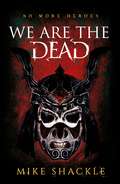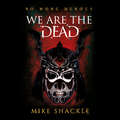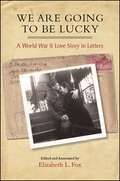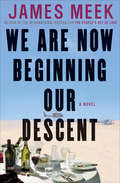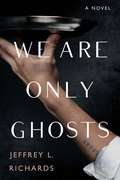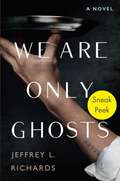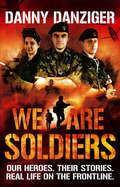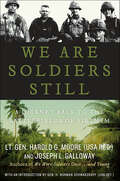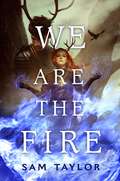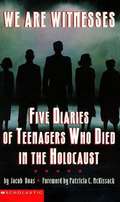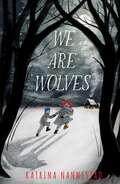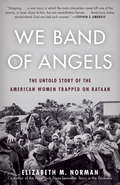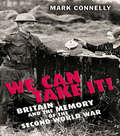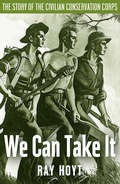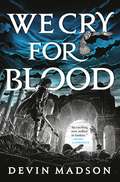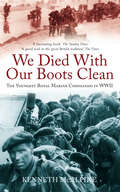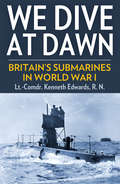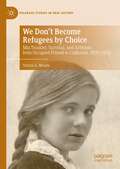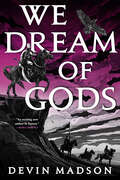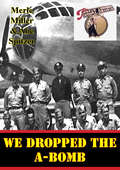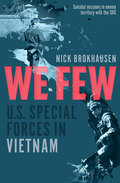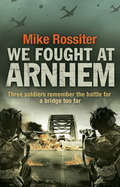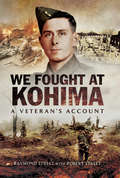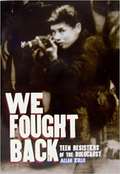- Table View
- List View
We Are The Dead: Book One (The Last War #1)
by Mike ShackleThe first book in The Last War series: a debut epic fantasy full of crunching revolutionary action, twisted magic, and hard choices in dark times.The war is over. The enemy won.Jia's people learned the hard way that there are no second chances. The Egril, their ancient enemy, struck with magic so devastating that Jia's armies were wiped out. Now terror reigns in the streets, and friend turns on friend just to live another day.Somehow Tinnstra - a deserter, a failure, nothing but a coward - survived. She wants no more than to hide from the chaos.But dragged into a desperate plot to retake Jia, surrounded by people willing to do anything to win the fight, this time Tinnstra will need to do more than hide.If Jia is to get a second chance after all, this time she will need to be a hero.With all the grit of Joe Abercrombie, Mark Lawrence and Ed McDonald, this is fantasy with the sharpest of edges.* * * * * * * * * *'The next Game of Thrones' Glen Cook, author of The Black Company'Tarantino crossed with David Gemmell' Peter McLean, author of Priest of Bones'A powerful debut' Gavin Smith, author of The Bastard Legion
We Are The Dead: The bone shattering epic fantasy thriller (The Last War #1)
by Mike ShackleThe first book in The Last War series: a debut epic fantasy full of crunching revolutionary action, twisted magic, and hard choices in dark times.The war is over. The enemy won.Jia's people learned the hard way that there are no second chances. The Egril, their ancient enemy, struck with magic so devastating that Jia's armies were wiped out. Now terror reigns in the streets, and friend turns on friend just to live another day.Somehow Tinnstra - a deserter, a failure, nothing but a coward - survived. She wants no more than to hide from the chaos.But dragged into a desperate plot to retake Jia, surrounded by people willing to do anything to win the fight, this time Tinnstra will need to do more than hide.If Jia is to get a second chance after all, this time she will need to be a hero.With all the grit of Joe Abercrombie, Mark Lawrence and Ed McDonald, this is fantasy with the sharpest of edges.* * * * * * * * * *'The next Game of Thrones' Glen Cook, author of The Black Company'Tarantino crossed with David Gemmell' Peter McLean, author of Priest of Bones'A powerful debut' Gavin Smith, author of The Bastard Legion
We Are Going to Be Lucky: A World War II Love Story in Letters (Excelsior Editions)
by Elizabeth L. FoxWe Are Going to Be Lucky tells the story of a first-generation Jewish American couple separated by war, captured in their own words. Lenny and Diana Miller were married just one year before America entered World War II. Deeply committed to social justice and bonded by love, both vowed to write to one another daily after Lenny enlisted in 1943. As Lenny made his way through basic training in Mississippi to the beaches of Normandy and eventually to the Battle of the Bulge, Diana struggled financially, giving up her job as a machinist to become a mother. Their contributions to the war effort—Lenny's crucial missions as an Army scout and Diana's work in the Brooklyn Navy Yard—are the backdrop to their daily correspondence, including insightful discussions of democracy, politics, and economic hardship.Faced with grueling conditions overseas, Lenny managed to preserve every letter his wife sent, mailing them back to her for safekeeping. The couple's extraordinary letters, preserved in their entirety, reveal and reflect the excruciating personal sacrifices endured by both soldiers at war and their young families back home. After decades of gathering dust, their words have been carefully transcribed and thoughtfully edited and annotated by Elizabeth L. Fox, Lenny and Diana's daughter.
We Are Now Beginning Our Descent: A Novel
by James Meek&“[A] sharply observed meditation on modern war . . . as far from Tom Clancy&’s entertainments as a vintage Mini Cooper is from a snarling Hummer&” (Alex Berenson, The New York Times Book Review). James Meek&’s masterful historical novel, The People&’s Act of Love, received accolades around the world, earning Meek comparisons to Tolstoy, Dostoyevsky, Conrad, and Greene. We Are Now Beginning Our Descent is a tour de force of storytelling, furthering his reputation as one of the most exciting and original young novelists writing today. Adam Kellas, a British journalist, would-be thriller novelist, and failed lover meets Astrid Walsh, a self-possessed, hard-charging reporter while the two are covering allied military operations in the Afghan mountains. After sharing one passionate night in a watchtower near a defunct airfield, Astrid disappears from Adam&’s life. A year later, following a disastrous dinner party in London during which he destroys his few remaining friendships, Adam receives a short, beseeching email and hastily embarks on a transatlantic journey to a small town near the Chesapeake Bay where he believes Astrid waits for him. He envisions the fresh start his new life with Astrid might offer, unaware that she may be harboring unsettling secrets of her own. A passionate, incisive novel, We Are Now Beginning Our Descent lays bare the entwined hypocrisies, foibles, and desires of our age, and is a testament to the obsessive pull of love. &“I am full of admiration for Meek&’s precise and lyrical prose, for his mapping of the political landscapes through which his characters drift and for his evocation of the strange, torn geometries of the life in the global news stream.&” —The Washington Post
We Are Only Ghosts: A Remarkable Novel of Survival in the Wake of WWII
by Jeffrey L. RichardsAn exhilarating, brutally candid saga about sexuality and war, tenderness and trauma, young passion and fierce hate, as a teenage boy&’s unexpected, complicated relationship with a Nazi officer in a WWII death camp is resurrected in 1960s New York City.We Are Only Ghosts depicts queer desire against the horrors of death camps and the psychosis of those who got out alive—haunted forever by those who did not—balancing the violence and hatred of war and its aftermath with many poignant moments of tenderness and joy. For readers of A Little Life by Hanya Yanagihara, The Heart's Invisible Furies by John Boyne, and Young Mungo by Douglas Stuart.New York City, 1968: The customers at Café Marie don&’t come just for the excellent coffee and pastries. They come for the sophisticated ambiance, and the illusion of being somewhere other than a bustling, exhausting city. Headwaiter Charles Ward helps create that illusion through impeccable service—unobtrusive, nearly invisible, yet always watchful. It&’s a skill Charles honed as a young Jewish boy in war-torn Europe, when avoiding attention might mean the difference between life and death. But even then, one man saw him all too clearly—a Nazi officer who was both his savior and tormentor. At seventeen, Charles was deported to Auschwitz with his family. There he was singled out by Obersturmführer Berthold Werden, who hid him in his home. Their entanglement produced a tortured affection mixed with hatred that flares to life again, decades later, when Berthold walks into Café Marie. Drawn back into Berthold&’s orbit, Charles is forced to revisit the pain and the brief, undeniable pleasures of the life he once knew. And if he acts on his growing hunger for revenge, will he lose his only tether to the past—the only other witness to who he was and everything he endured—or find peace at last?
We Are Only Ghosts: Sneak Peek
by Jeffrey L. RichardsBe one of the first to read this sneak preview sample edition before the full length novel comes out!An extraordinary, emotionally intense novel spanning World War II Europe to 1960s New York City with an unsettling psychological edge, We Are Only Ghosts depicts not only the horrors of the death camps but the toll on those who survived—powered by a story of the unexpected, complicated connection between a Nazi officer and a young Jewish boy. New York City, 1968: The customers at Café Marie don&’t come just for the excellent coffee and pastries. They come for the sophisticated ambiance, and the illusion of being somewhere other than a bustling, exhausting city. Headwaiter Charles Ward helps create that illusion through impeccable service—unobtrusive, nearly invisible, yet always watchful. It&’s a skill Charles honed as a young Jewish boy in war-torn Europe, when avoiding attention might mean the difference between life and death. But even then, one man saw him all too clearly—a Nazi officer who was both his savior and tormentor. At seventeen, Charles was deported to Auschwitz with his family. There he was singled out by Obersturmführer Berthold Werden, who hid him in his home. Their entanglement produced a tortured affection mixed with hatred that flares to life again, decades later, when Berthold walks into Café Marie. Drawn back into Berthold&’s orbit, Charles is forced to revisit the pain and the brief, undeniable pleasures of the life he once knew. And if he acts on his growing hunger for revenge, will he lose his only tether to the past—the only other witness to who he was and everything he endured—or find peace at last?
We Are Soldiers: Our Heroes. Their Stories. Real Life on the Frontline.
by Danny DanzigerWhat is it like to drive a Challenger tank over desert terrain for six days in a row? Or hover an Apache AH1 attack helicopter a hundred metres above enemy ground? How quickly can a Sapper clear a field of unexploded devices, or build a bridge - or blow one up? What is it like to fix bayonets, and engage in hand to hand combat, or train a 5.56 mm SA80 sniper sight on an enemy soldier, and pull the trigger? How do you find out what a soldier must learn on his way to war...? Ask him.In this extraordinary book, Danny Danziger interviews the people who fight our wars for us, providing a unique insight into the reality of what we ask of our armed forces. Groundbreaking and utterly compelling, WE ARE SOLDIERS takes the reader to the heart of the 21st century soldier's experience.
We Are Soldiers: Our heroes. Their stories. Real life on the frontline.
by Danny DanzigerWhat is it like to drive a Challenger tank over desert terrain for six days in a row? Or hover an Apache AH1 attack helicopter a hundred metres above enemy ground? How quickly can a Sapper clear a field of unexploded devices, or build a bridge - or blow one up? What is it like to fix bayonets, and engage in hand to hand combat, or train a 5.56 mm SA80 sniper sight on an enemy soldier, and pull the trigger? How do you find out what a soldier must learn on his way to war...? Ask him.In this extraordinary book, Danny Danziger interviews the people who fight our wars for us, providing a unique insight into the reality of what we ask of our armed forces. Groundbreaking and utterly compelling, WE ARE SOLDIERS takes the reader to the heart of the 21st century soldier's experience.
We Are Soldiers Still: A Journey Back to the Battlefields of Vietnam
by Lt. Gen. Harold G. Moore Joseph L. Galloway“Powerful. . . . A candid, highly informative, and heartfelt tale of forgiveness between former fierce enemies in the Vietnam War.” —St. Petersburg TimesThe #1 New York Times bestseller We Were Soldiers Once . . . and Young brought to life one of the most pivotal and heartbreaking battles of the Vietnam War. In this powerful sequel, Lt. Gen Harold G. Moore and Joseph L. Galloway bring us up to date on the cadre of soldiers introduced in their first memoir.Returning to Vietnam’s Ia Drang Valley more than four decades after the battle, Moore and Galloway renew their relationships with ten American veterans of the fabled conflict—and with former adversaries—exploring how the war changed them all, as well as their two countries. We Are Soldiers Still is an emotional journey back to hallowed ground, putting a human face on warfare as the authors reflect on war’s devastating cost. The book includes an Introduction by Gen H. Norman Schwarzkopf.
We Are the Fire
by Sam TaylorAs electrifying as it is heartbreaking, Sam Taylor's explosive fantasy debut We Are the Fire is perfect for fans of An Ember in the Ashes and the legend of Spartacus.All will burn.In the cold, treacherous land of Vesimaa, children are stolen from their families by a cruel emperor, forced to undergo a horrific transformative procedure, and serve in the army as magical fire-wielding soldiers. Pran and Oksana—both taken from their homeland at a young age—only have each other to hold onto in this heartless place.Pran dreams of one day rebelling against their oppressors and destroying the empire; Oksana only dreams of returning home and creating a peaceful life for them both.When they discover the emperor has a new, more terrible mission than ever for their kind, Pran and Oksana vow to escape his tyranny once and for all. But their methods and ideals differ drastically, driving a wedge between them. Worse still, they both soon find that the only way to defeat the monsters that subjugated them may be to become monsters themselves.Praise for We Are the Fire:"Bold and immersive, We Are the Fire is a strong new addition to the YA fantasy canon, full of characters with heart fighting despite their circumstances." —Emily A. Duncan, New York Times-bestselling author of Wicked Saints"At once brutal and tender, this heart-pounding debut will make you ponder what it means to be monstrous—and what it costs to be human." —Joanna Ruth Meyer, author of Echo North and Into the Heartless Wood "Set to fill the Ember in the Ashes-shaped void in your heart." —Culturess
We Are Witnesses: Five Diaries of Teenagers Who Died in the Holocaust
by Jacob BoasDavid Rubinowicz, Yitzhak Rudashevski, Moshe Flinker, Eva Heyman, and Anne Frank were all teenagers during World War II. They lived in different parts of Europe. They had different lives. But they all had something in common: They were Jewish, and therefore, under Hitler's twisted rule, they were five of the six million men, women, and children sentenced to death.
We Are Wolves
by Katrina NannestadThis haunting, heart-stopping middle grade novel follows three of the Wolfskinder, German children left to fend for themselves in the final days of World War II, as they struggle to hold onto themselves and each other while surviving in the wild.Sometimes it&’s good to be wild. Sometimes, you have to be. When the Russian Army marches into East Prussia at the end of World War II, the Wolf family must flee. Being caught by the Russians or Americans would be the end for them. Liesl, Otto, and baby Mia&’s father has already been captured, and they get separated from their mother in a blizzard after only a few days on the run. Liesl promised Mama that she&’d keep her brother and sister safe, no matter what. They&’ll forage in the forests if they have to. Little do they know at the start that there are hundreds of other parentless children doing the same thing. And they far too quickly learn that, sometimes, to survive, you have to do bad things. Dangerous things. Wild things. Sometimes you must become a wolf.
We Band of Angels: The Untold Story of the American Women Trapped on Bataan
by Elizabeth M. Norman"This is a gripping book. Elizabeth Norman presents a war story in which the main characters never kill one of the enemy, or even shoot at him, but are nevertheless heroes. . . . First on Bataan, then moved to Corregidor, they were under almost constant shell fire, were always hungry, close to starvation, had horrendous diseases to deal with despite a shortage or even a complete lack of proper medicines, getting little or no sleep, nothing in the way of recreation--yet they were a true band of angels, inspiring all the men whom they were there to help. In a squalid prison camp, they remained giants, despite their small size. . . . They were the bravest of the brave, who endured unspeakable pain and torture. Americans today should thank God we had such women." --Stephen E. AmbroseWe Band of Angels is the story of women searching for adventure, caught up in the drama and danger of war. On the same day the Japanese Imperial Navy launched its surprise attack on Pearl Harbor in Hawaii, it also struck American bases in the Far East, chief among them the Philippines. That raid led to the first major land battle for America in World War II and, in the end, to the largest defeat and surrender of American forces. Caught up in all of this were ninety-nine Army and Navy nurses--the first unit of American women ever sent into the middle of a battle. The "Angels of Bataan and Corregidor"--as the newspapers called them--became the only group of American women captured and imprisoned by an enemy. And the story of their trials on a bloody battlefield, their desperate flight to avoid capture and their ultimate surrender, imprisonment, liberation and homecoming is a story of endurance, professionalism and raw pluck. Along the way, they helped build and staff hospitals in the middle of a malaria-infested jungle on the peninsula of Bataan. Then, short of supplies and medicine, they worked around the clock in the operating rooms and open-air wards, dealing with gaping wounds and gangrenous limbs, ministering to the wounded, the sick, the dying. A few fell in love, only to lose their men to the enemy. Finally, on the tiny island of Corregidor in Manila Bay, the Japanese took them prisoner. For three long years in an internment camp--years marked by loneliness and starvation--they kept to their mission and stuck together. In the end, it was this loyalty, this sense of purpose, womanhood and honor, that both challenged and saved them. Through interviews with survivors and through unpublished letters, diaries and journals, Elizabeth M. Norman vividly re-creates that time, telling the story in richly drawn portraits and in a dramatic narrative delivered in the voices of the women who were there.NOTE: This edition does not include a photo insert.
We Can Take It!
by Mark Connelly`We Can Take It!' shows that the British remember the war in a peculiar way, thanks to a mix of particular images and evidence. Our memory has been shaped by material which is completely removed from historical reality. These images (including complete inventions) have combined to make a new history. The vision is mostly cosy and suits the way in which the Britons conceive of themselves: dogged, good humoured, occasionally bumbling, unified and enjoying diversity. In fact Britons load their memory towards the early part of the war (Dunkirk, Blitz, Battle of Britain) rather than when we were successful in the air or against Italy and Germany with invasions. This suits our love of being the underdog, fighting against the odds, and being in a crisis. Conversely, the periods of the war during which Britain was in the ascendant are, perversely, far more hazy in the public memory.
We Can Take It: The Story of the Civilian Conservation Corps
by Ray Hoyt“We Can Take It”, first published in 1935, is an early history of the Civilian Conservation Corps (CCC). The CCC, considered one of President Franklin D. Roosevelt’s most successful New Deal programs, operated from 1933 to 1942 and provided natural resource-related work for young men, ages 18-25, during the Great Depression. In the program’s nine years, 3 million young men participated in the CCC. In return for their work, the men received training in a variety of skills, living quarters, clothing, and food, and a small wage of $30 a month ($25 of which had to be sent home to their families). The accomplishments of the CCC remain evident today in the nation’s national forests, parks, roads and trails. Included are 10 pages of pen and ink illustrations.
We Cry for Blood (The Reborn Empire #3)
by Devin Madson"A complex tale of war, politics, and lust for power." —The GuardianAlliances fracture and hope wanes in a ravaged empire caught between three factions in the heart-pounding continuation of Devin Madson's bold epic fantasy series, The Reborn Empire.Ambition and schemes have left the Kisian Empire in ashes. Empress Miko Ts&’ai will have to move fast if she hopes to secure a foothold in its ruins. However, the line between enemies and allies may not be as clear-cut as it first appeared.After failing to win back his Swords, former Captain Rah e&’Torin finds shelter among the Levanti deserters. But his presence in the camp threatens to fracture the group, putting him on a collision course with their enigmatic leader.Assassin Cassandra Marius knows Leo Villius&’s secret—one that could thwart his ambitions to conquer Kisia. But her time in Empress Hana&’s body is running out and each attempt they make to exploit Leo&’s weakness may be playing into his plans.And, as Leo&’s control over the Levanti emperor grows, Dishiva e&’Jaroven is caught in his web. She&’ll have to decide how many of her people are worth sacrificing in order to win.Praise for The Reborn Empire:"Imaginative worldbuilding, a pace that builds perfectly to a heart-pounding finale and captivating characters. Highly recommended." —John Gwynne, author of The Shadow of the Gods"An exciting new author in fantasy."―Mark Lawrence, author of Red Sister"Visceral battles, complex politics, and fascinating worldbuilding bring Devin's words to life."―Anna Stephens, author of Godblind The Reborn EmpireWe Ride the StormWe Lie with DeathWe Cry for BloodFor more from Devin Madson, check out:The Vengeance TrilogyThe Blood of WhisperersThe Gods of ViceThe Grave at Storm's End
We Died With Our Boots Clean: The Youngest Royal Marine Commando in WWII
by Kenneth McAlpineAt the age of seventeen, Kenneth McAlpine ran away from the Repton school to join Churchill's new elite special force, the Royal Marine Commandos. As the youngest member of the youngest commando force, after three months he found himself fighting on the beaches of Normandy. In We Died With Our Boots Clean, McAlpine tells his own unique story of World War II and his highly eventful military career. From an unusual encounter with Montgomery and Patton, a concerted attempt to kill a sergeant major and his best friend’s arrest for swearing at the Queen of Holland, McAlpine paints a fascinating picture of commando life and the harsh training that prepared soldiers for frontline combat in an elite unit. Full of absorbing anecdotes such as his time in a military prison and a rescue operation at a concentration camp, this book is an essential part of a World War II enthusiast’s library.
We Dive at Dawn
by Lt.-Comm. Kenneth EdwardsWe Dive at Dawn, first published in 1941, is the authoritative and highly readable account of Royal Navy submarines during World War I (with a final chapter on submarine warfare in the early years of World War II). Written by Lt.-Commander Kenneth Edwards, the book covers a wide-range of topics: the development of the various British submarine classes, German U-boats, encounters with German and Turkish ships and aircraft, sabotage missions on land, anti-submarine techniques (nets, cables, depth-charges), accidents and rescues at sea (including gripping accounts of men escaping flooded submarines). In addition to the workings of the subs themselves, the actions of the men, so many of whom died during their service, are also well-portrayed. One cannot but help to have a great deal of respect for the submariners in, as the author puts it, "particularly hazardous service." Included are 4 maps and 16 pages of photographs.
We Don't Become Refugees by Choice: Mia Truskier, Survival, and Activism from Occupied Poland to California, 1920-2014 (Palgrave Studies in Oral History)
by Teresa A. MeadeThis book traces the life of Maria Mia Truskier, who fled the Nazis as a young Polish Jew in early 1940 and once safely resettled in the United States, became an activist for other refugees, earning renown in the Bay Area as “the oldest refugee” of the East Bay Sanctuary Covenant. Mia worked for decades assisting those fleeing from war, violence and hardship, mainly from Central America and Haiti. Based on extensive interviews with Truskier before she passed away, as well as memorabilia from her own lifetime, including coded letters, newspaper clippings, and old photographs, this book results in a complex and multi-layered oral history. As Mia drew on memories of her life in Europe and World War II, she was situating and constructing those memories while re-reading and discovering these artifacts alongside the author of this book, and ultimately relating the ways that she and her family years later sought to make a difference for other refugees, drawing a connection between two major eras of human displacement: the end of World War II and today.
We Dream of Gods (The Reborn Empire #4)
by Devin MadsonIn this "complex tale of war, politics, and lust for power" (The Guardian), the fate of the world is decided when heroes and gods march into battle one last time in the searing conclusion of this bold and bloody epic fantasyseries.There are no gods. Only men. Betrayed by her closest allies, Empress Miko Ts&’ai is thrust from ruler to pawn. But she won&’t suffer the whims of men. A string of dangerous gambles could win Miko her empire for good, but to take back the throne, she must become everything her ancestors failed to be. Rah e&’Torin leads a herd again. Now he seeks to honor a promise he made a lifetime ago—to safely bring his Swords home. Yet Rah&’s loyalty to the past may be his ultimate undoing. Cassandra Marius is lost. Ensnared by memories that aren&’t her own, Cass must decide who she really is, but the answer lies beyond one final confrontation with Leo Villius. And trapped in the heart of the Chiltaen army, Dishiva e&’Jaroven is handed unexpected power. The dream of a new homeland is within her grasp—if she risks everything and trusts her former enemies. Praise for The Reborn Empire: "Imaginative worldbuilding, a pace that builds perfectly to a heart-pounding finale and captivating characters. Highly recommended." —John Gwynne, author of The Shadow of the Gods "An exciting new author in fantasy." —Mark Lawrence, author of Red Sister The Reborn EmpireWe Ride the StormWe Lie with DeathWe Cry for Blood We Dream of Gods For more from Devin Madson, check out: The Vengeance TrilogyThe Blood of WhisperersThe Gods of ViceThe Grave at Storm's End
We Dropped The A-Bomb
by Merle Miller Abe SpitzerThe amazing story of the crew of the B-29 bomber The Great Artiste, who flew in both missions that dropped atomic bombs on Hiroshima and Nagasaki. Written by noted novelist and script writer Merle Miller and the radio operator of the B-29 Abe Sptizer, it is a fascinating first-hand account of the end of World War II and the beginning of the Nuclear Age."None of us knew for sure what the "gimmick" was, not even after the fire and smoke rolled up toward us from Hiroshima and it looked as if the sun had fallen out of the sky and was on the ground. Not until a few minutes later when we had broken away from the danger zone and Colonel Paul W. Tibbets, our group commander and pilot of the B-29 that let go with the first bomb, said over the radio, "Well, boys, you have just dropped the first atomic bomb in history.""Even then it didn't sink in. I didn't know what an atomic bomb was or what it had done to the city of Hiroshima below or what a far worse bomb would do a few days later when we let it go over Nagasaki."
We Few: U.S. Special Forces in Vietnam
by Nick BrokhausenA Green Beret&’s gripping memoir of American Special Forces in Southeast Asia during the Vietnam War. In 1970, on his second tour to Vietnam, Nick Brokhausen served in Recon Team Habu, CCN. Officially, it was known as the Studies and Observations group. In fact, this Special Forces squad, which Brokhausen calls &“an unwashed, profane, ribald, joyously alive fraternity,&” undertook some of the most dangerous and suicidal reconnaissance missions ever in the enemy-controlled territory of Cambodia and Laos. But they didn&’t infiltrate the jungles alone. They fought alongside the Montagnards—oppressed minorities from the mountain highlands, trained by the US military in guerilla tactics, armed, accustomed to the wild, and fully engaged in a war against the North Vietnamese. Together this small unit formed the backbone of ground reconnaissance in the Republic of Vietnam, racking up medals for valor—but at a terrible cost. &“In colorful, military-jargon-laced prose leavened by gallows humor, Brokhausen pulls few punches describing what it was like to navigate remote jungle terrain under the constant threat of enemy fire. A smartly written, insider&’s view of one rarely seen Vietnam War battleground.&” —Booklist &“[An] exceptionally raw look at the Vietnam War just at the apex of its unpopularity. . . . This battle-scarred memoir is an excellent tribute to the generation that fought, laughed, and died in Southeast Asia.&” —New York Journal of Books
We Fought at Arnhem
by Mike RossiterOperation Market Garden: a plan to capture the bridge over the Rhine at Arnhem and outflank the German front. In all twelve thousand airborne troops were to land, either by parachute or glider, at three drop zones and move towards their objective. As the world now knows the mission was to be 'a bridge too far' for the British forces. Mike Rossiter has interviewed three of the survivors of those fateful days, each involved in a different flank of the British attack, and in vivid detail reconstructs the events that lead up to this most famous of glorious defeats. It is at once a story of hubris and bad planning, but also of valiant sacrifice and inspirational courage.
We Fought at Kohima: At Veteran's Account
by Raymond Street Robert StreetThe Japanese advance through Thailand, Malaya and Burma appeared unstoppable and the fate of India looked utterly precarious.The garrison of the Kohima outpost numbering some 1500 British and Indian Army soldiers faced over 13,000 fanatical and previously victorious Japanese troops. The following sixteen days marked the turning point of the war in the Far East thanks to men like Raymond Street who fought with legendary courage and tireless persistence.Raymond was a member of the 4th Battalion The Queen's West Kent and as a company runner he was uniquely placed to witness the dreadful and dramatic events as they unfolded. Not only did he miraculously survive but he made a superb record of the battle as fortunes ebbed and flowed. His memories have been transcribed into this first-hand account of one of the most decisive and hardest fought battles of the Second World War. We Fought at Kohima will surely be judged as a fighting man's memoir of the highest quality to rank alongside such legendary works as Men at Arnhem and Quartered Safe Out Here.
We Fought Back: Teen Resisters of the Holocaust
by Allan ZulloFifteen year old Paul just helped blow up a Nazi supply train. Can he escape the Germans hunting him for revenge? Fifteen year old Sarah has lost many loved ones to Nazi murderers. Will partisan fighters accept her into their secret group? Seventeen year old Frank and his team are preparing to attack a heavily armed German convoy. Can they succeed against overwhelming odds--and survive? These and other Jewish young people took on incredible risks to fight back against the Nazis in WWII. You will never forget their true stories of courage and survival.
